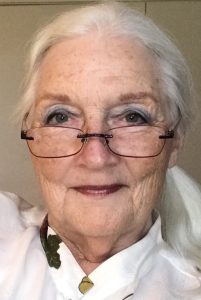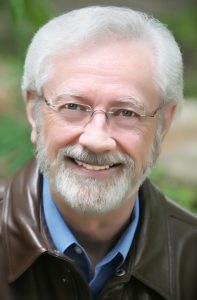This is the second in a series of articles.
Life seemed simpler when we didn’t know so much. The problem is, no matter how much we learn there is always so much more to know. Every solution seems to reveal a whole new set of questions.
Most days that is exciting. But some days we just want to shout, “Stop the world! I want to get off!” And that’s how we responded the first time I saw the letters LGBTQ. We didn’t want to know what all that meant. Or, perhaps more honestly, we didn’t want to think about what we would need to learn — and unlearn.

Linda Cross

Dan McGee
Depending on which book you read or website you visit, there are whole lists of new words and phrases to be absorbed into our consciousness, vocabulary to be learned, unlearned and relearned. So, let’s take a step back and look at the bigger picture to establish a framework for learning.
Competence and humility
Jon Singletary, dean of Baylor University’s Garland School of Social Work, suggests two aspects of this framework: Cultural competence and cultural humility.
Cultural competence requires us to develop skills that “promote well-being among populations with diverse lived experiences, culture, values and beliefs.” This takes effort on our part to recognize, understand and respect cultures other than our own. But this is the easy part, the “head” part, where we add multicultural knowledge, comprehension and sophistication to our toolbox of accomplishments.
Cultural humility is the harder part, the “heart” part, where we let go of our presumed superiority as Americans, Christians, you-name-it, and admit that, in fact, we do not know it all. We must learn to ask honest questions, not gotcha ones, and we must be willing to listen to and hear the answers. We must climb down off our high horse and walk as Jesus walked among folk who are more like us than we want to admit. We must recognize that the people we meet are the experts on their own lives and we are not.
Three dimensions to gender and sexuality
In addition to the framework of cultural competence and cultural humility, there are three interconnected but distinct dimensions to understanding gender and sexuality: gender identity, gender expression and sexual orientation. Singletary defines these distinctions.
Gender identity is an “individual’s internal, deeply felt sense of being a man, a woman, both, neither, or in between. This may or may not match the individual’s biological or legal sex.”
Gender expression is an “individual’s characteristics and behaviors … that are typically perceived as masculine or feminine.”
Sexual orientation is “an identity based on a person’s sexual attraction to others and how that person’s own gender corresponds to the gender of the people to whom that person is attracted.”
What’s behind LGBTQ?
As in learning any new language, learning the language of gender identity, gender expression and sexual orientation requires some vocabulary work. The following is certainly not comprehensive, but with use these words can open your ears to understand your neighbors in ways you may never have considered before.
We will start with the letters LGBTQ:
- L stands for lesbian, a woman who is sexually attracted to women.
- G stands for gay, men who are attracted to men, although often used to refer to all LGBTQ folk.
- B may stand for bigender, a person whose gender identity is a combination of man and woman, and also is used more commonly for bisexual.
- T stands for transgender or trans, persons whose gender identity is different from their assigned sex at birth.
- Q stands for queer, a word originally dismissive or derogatory in intent, but in some contexts becoming accepted as a general word for LGBTQ folk.
- In some instance, the + sign is added to recognize that some individuals may not identify with any of the gender identities or sexual orientations represented by the acronym.
Probably the least familiar of all these new words is “cisgender.” Cisgender, cis from Latin for “on the near side of,” or “on the same side of,” refers to folk who identify as the gender they were assigned at birth. In that cisgender does not presume correctness or wholeness, it is a kinder word than “straight,” the alternative to which is brokenness or crookedness. Another word falling out of use is “homosexual.”
Language matters
It’s not easy to take all this information in, sort it out and accept it. But there are some steps we can take to begin the process of becoming kinder to folk whose experience is so different from our own.
“Sneering, derogatory or dismissive language in any cultural context is harmful, unkind and un-Christlike.”
The first step is to remember that language matters. The old saw “sticks and stones may break my bones, but words can never hurt me” is not true. Words may not break bones, but they can break hearts and cripple spirits. Using correct language in gender and sexuality conversations is as important as correct language is in any conversation. Sneering, derogatory or dismissive language in any cultural context is harmful, unkind and un-Christlike.
Using the correct pronouns for persons — they/them/their, she/her/her, or he/him/him — shows respect for others and recognizes their dignity whether you understand their situation or not. Perhaps most importantly, use a person’s preferred or chosen name. “Deadnaming” is calling a transgender person by their birth name instead of their chosen name. Regardless of why a person changes his, her or their name, they must have a reason that is important to them. Respect that choice. Respect that person.
R-E-S-P-E-C-T. Isn’t that what we all want? Isn’t that what Jesus would do?
Dan McGee is an author, blogger and consultant on spiritual issues with an extensive background in psychology and ministry. He is an ordained Baptist minister with a bachelor’s degree from Baylor University, master’s degree from Southwestern Baptist Theological Seminary and Ph.D. from Texas Woman’s University. As a clinical sexologist and director of the Hardin-Simmons University Graduate Program in Family Psychology, Dan directed the Family Psychology Center and was responsible for clinical supervision of all interns in practice there and at satellite centers across West Texas. He is the author of Celebrating Sex in Your Marriage and Experiencing God’s Presence. Linda Francis Cross is a professional writer and communications consultant covering spiritual issues and biblical curriculum. She was an advocate for leadership development for CBF Global Missions and prior to that director of the Baptist Laity Institute of the Baptist General Convention of Texas. She has served as editor on several books and as a co-author for Radical Excellence. She is an ordained Baptist minister and earned her bachelor’s and master’s degrees from Baylor University.
Other articles in this series:
When a teenager gets kicked to the curb by Christian parents


